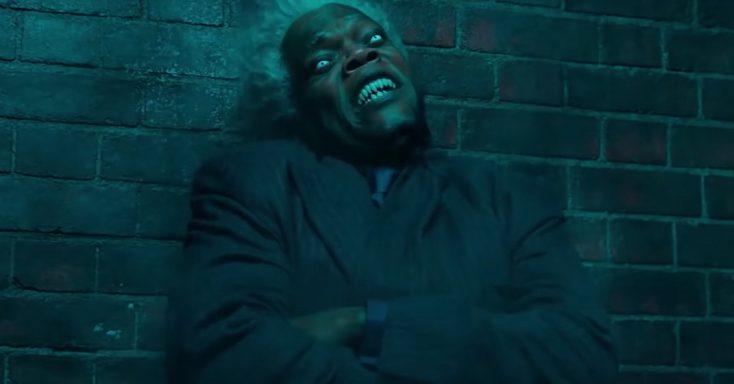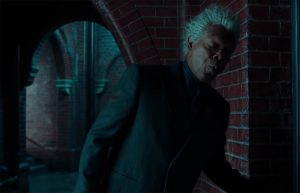By ANGELA DAWSON
Front Row Features
Wearing a wiry grey wig, white contact lenses and a dental appliance that gives him menacing pointy teeth, Samuel L. Jackson is almost unrecognizable as the villainous Barron in Tim Burton’s fantasy adventure “Miss Peregrine’s Home for Peculiar Children.“
The ubiquitous actor—he starred this year’s “Cell” and “The Legend of Tarzan” and recently wrapped production on next year’s “Kong: Skull Island”—says he enjoys playing villains because they typically have more interesting and complex personalities.
Surprisingly, “Miss Peregrine’s Home for Peculiar Children” marks the first collaboration between Jackson and Burton, who is best known for his creepy tales that frequently involve outsiders as protagonists. His latest work is no exception.
Based on the Ransom Riggs novel of the same name, Miss Peregrine’s Home for Peculiar Children centers on a mysterious facility that houses children with unusual abilities, like invisibility, being able to float in the air, the ability to conjure fire and more. The children are cared for by a woman named Miss Peregrin (Eva Green), who can change into a bird. She also has the ability to turn back time, and she does so on a daily basis, precisely before a bomb drops on their English countryside home during World War II. The children are safe but they also never get a chance to grow up. The routine is disrupted when Jake (Asa Butterfield), a young boy enters their world, drawn to it because of the strange bedtime stories his grandfather used to tell. Little does Jake realize he is being followed, and his pursuer, Jackson’s Barron, leader of a group of undead peculiar hunters known as the Wights, has nefarious intentions toward Miss Peregrine and her charges.
Jackson, 67, spoke about working with Burton, playing a villain and embracing one’s uniqueness.
Q: Did you have some input into your character’s appearance?
Jackson: Not at all. Tim (Burton) sent me renderings of what Mr. Barron was going to look like and I was like, “OK, I like it.” I had him send me the teeth a month early so I could wear them and do my ABC’s and learn how to say things, look at the script and see if I could talk with them in and get to a point where I was very comfortable wearing them. The only thing I couldn’t practice for were the eyes.
Q: Did the contacts hurt your eyes?
Jackson: They’re irritating for about 10 minutes and then you get used to them. Then after about three hours you go, “OK, that’s enough. That’s enough!”
Q: How did this project come to you?
Jackson: I talked to Tim before I got (England), but they just told me Tim Burton wanted me to do this particular project, then they sent it to me and I read it. I had pretty much said yes before I even got a hold of a script. “Tim Burton?” “Yeah.” “He wants me?” “Yeah.” “OK, good.”
Q: Did you read the novel as well as the script?
Jackson: You always read the source material. If there’s source material you read it, because it gives you a lot more information than the script normally does. You find out more about the character, where he came from and what his relationships are with other people. There’s always more stuff going on in a book than in a script.
Q: What did you like about Barron?
Jackson: In my mind, he was more interested in regaining his humanity and immortality than the monstrous aspects of what his character portrayed. For me, it was more about creating something that an audience could look at and not always be fearful of. You could see him and see the flashes of humanity in him before that monster takes hold of him. He has a sense of humor or, at least, he has a cynical worldview and he’s very clear about what his mission is.
Q: I love the humor in your character; it makes him even scarier.
Jackson: Oh, good. You can spend a whole movie being a monster but that’s not interesting to an audience. It helps and it shocks them when you do that other thing because it’s like, “Oh well, I didn’t know he could go that far. I didn’t know that was going to happen there” or, “What triggered that?” It kind of keeps everybody off balance.
Q: Tim Burton is such a distinctive filmmaker and I gather from what you’ve said that you were looking forward to working with him. Of his previous movies, is there one you specifically like?
Jackson: I like his “Planet of the Apes” movie. I like “Edward Scissorhands.” There’s not a lot he’s done that you can’t like or won’t like. The cinematic skill is just so evident and the way you leave a Tim Burton film, feeling like you’ve lived in some alternate reality that had its own set of rules and regulations that made you believe it, always fascinated me. A lot of people try that and they don’t accomplish it. You feel like somebody tried to make you believe something that wasn’t real, but when you leave there, you have a belief in the rules and everything that happened in that world that could actually be something that you could experience.
Q: How different is Tim’s working style compared with directors that you’ve frequently worked with, like Quentin Tarantino?
Jackson: A lot of directors are mechanics. They understand how to make a film and they go master it, “Closer. Over, over.” They might have some input into how the story goes or what they’re doing, but most of them are looking at a monitor. They’re worried about the balance of what people are looking at on screen, so this person’s there, that person’s there, there’s more air at the top, more at the bottom. There are some filmmakers like Tim and Quentin who know what they want to do and they know how they want to tell their story and they can explain that to you.
Still, within the context of that, or the box that they’ve built around how they want to do something or what they do, you are able to create the inside of it and expand what’s there to the parameters of that box and enhance it. They appreciate it and they let you know. When you finish doing a scene for Tim or Quentin, it’s like a big exclamation and they’re clapping their hands, or Tim skips around. “That was amazing. That was great. I didn’t see it that way but uh, yeah, yeah, yeah, yeah!” He’ll say, “More of that, more of that, more of that.” It’s encouraging and it’s great. It makes you want to give them more than somebody who goes, “Yeah, that was great. Cut.”
Q: He’s very open to your ideas?
Jackson: Yeah. He’s not intimidated by what you bring. A lot of directors say, “Bring that back a little bit,” and you kind of go, “You do know what movie we’re making, right?” Sometimes they don’t. It’s like, “You do know this is a so-and-so movie?” ‘Yeah.” “Did you ever see a movie called, so-and-so?” “No.” “I didn’t think so, because that movie was good. This one’s not going to be.”
Q: The humorous asides that you have, was that in the script or was that something you brought in?
Jackson: That’s what I brought. Those were the things that I talked to Tim about. It was the whole human thing that he’s interested in, the immortality. Barron knows he messed up when he did that other experiment and he’s messed these other people up and he has a level of guilt about that, but he also lives in a real world where he craves his humanity. When he sees those kids who make him laugh, he kind of embraces that and he can react in an honest way to something by having surprise or wryness so that he is trying very hard to get back to being a person. He just wants to be immortal.
Q: How was working with Asa Butterfield and all of the young actors that are in the film?
Jackson: Oh they were great. By the time I showed up, they had been working together for a month or so, so they knew each other very well and they had this great relationship. They had established how they interacted with each other. I think the great thing was when I walked on set and I had the hair and the teeth and the eyes, they all just looked at me like, “Oh, hey yeah!” They were just ready to play with me. They were never afraid of me, which was great. When they were acting afraid they were acting, because most times they would just jump on me and pull me and take selfies. They were funny.
Q: The hashtag for this film is #StayPeculiar. Does that resonate with you, because if you’re an actor, you have to be a little peculiar in some ways, right?
Jackson: I like to think of myself as banal or as uninteresting as anybody else in a certain kind of way, but I have an interesting job. I read strange murder novels. I watch a lot of Asian films. But I have the ability to read something, interpret it and hopefully create a character that I present to an audience and they accept it, understand it and believe it. To me that’s a unique character, or a unique quality. “Peculiar” has a sort of negative connotation. You say, “Well that’s peculiar.” That’s something that you don’t understand and you don’t like. I want to understand it, which is far from being peculiar.
With the Millennial generation and the kids that are going to come after them, there is inclusiveness that’s happened now. We used to use derogatory words like “retarded” or whatever, but you don’t say that anymore. Those people are just “different.” They’re unique in another kind of way and the more we embrace their uniqueness, the more diverse and more interesting the world becomes. The more we embrace people’s uniqueness and not their peculiarities, because “peculiar” is being a serial killer or a pedophile. That’s peculiar. Unique—a lot of people are unique and it takes unique people to create a diverse and interesting world. I’m all for it.
Q: How fun for you to create bad guy?
Jackson: Bad guys are a little more interesting than good guys. Good guys have to have some specific qualities. They have to be specifically this, that or the other, straight ahead. Bad guys can have all kinds of unique things about them and they can even have good things about them. Bad guys can run an orphanage and really like kids and just have this really strange thing that they do. All bad guys don’t sit around polishing bullets and sharpening knives to go out and kill people. They have jobs, they have kids, they go to grocery stores, cook, sleep and make beds. They garden. They do all kinds of things. Bad guys can have really, really diverse and interesting kinds of lives that should surprise an audience, but they have this other thing that they do. You shouldn’t be able to just look at a guy and go, “Oh my God, he’s a killer.” Or, “I could see how he could do that.” I’d rather people figure out something else about my character.
Q: What kind of message do you want to give to a young audience after watching this movie?
Jackson: I think the message here is to embrace your uniqueness, to know that everyone has a contribution to make to society and the more confident you are in yourself and in your uniqueness—or in your sameness—the better it will be for the good of all.






